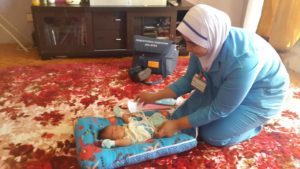Don’t they have other things to do?
Why not take a break?
Why are they pestering me when I am resting?
What is the relevance of these visits when I’m still pregnant?
Why are they here during my confinement period?
_____
Nurses come and visit you at home for good reasons! They don’t want to disturb your daily routine and they are not interfering in your life for fun. They won’t pop up suddenly at your doorstep; they will usually call you first to arrange a suitable time. If they are unable to contact you, they will only make an unannounced visit to make sure you go to the hospital on time, especially if you have a post-date pregnancy.
VISITS DURING PREGNANCY

Picture source: facebook.com
All nurses who work in health or community clinics are obligated to make home visits to expecting mothers regardless of where the “booking” is made.
House visits are done at least 3 times for uncomplicated pregnancies and as frequent as possible for mothers with antenatal issues or at risk of having diabetes and hypertension. However, this frequency is dependent on individual clinic policies or available staff.
The first visit is to ensure the pregnant mother is healthy and her home is hygienic and suitable for the impending arrival of her baby. It is also to build rapport between the nurse, mother and other family members as the nurse is now responsible for following up with the household.
For first time pregnant mothers, the nurse will make sure they are compliant with prescribed medications, antenatal vitamins and whether the Fetal Kick Chart is filled up correctly. Sometimes they catch mothers perfoming “chartology” – filling up the chart right up to a week ahead!
Wow, what an advanced baby!
Nurses also have to pay more attention to mothers with pregnancy-induced hypertension, gestational diabetes and twin/multiple pregnancies.
Finally, nurses play a role in ensuring the expectant mother has adequate moral support from family members so they don’t get too stressed. They also help identify any trigger factors that may bring on unnecessary stress. This support from nursing staff is particularly important for unwed mothers or those without families around.
POST-PARTUM VISITS
Home visits by nurses are usually made from day 1-6 post-delivery and then on days 8, 15 and 20. In the event the baby develops jaundice, the visits are made continuously from day 1-10.
During these visits, the nurses will examine the mother and pay special attention to the following:
- Blood pressure
- Temperature
- Pulse characteristics
- Breasts – in case of infection, as well as to reinforce proper breastfeeding techniques
- Qualities of the lochia (vaginal discharge) – looking at colour, odour and quantity to ensure there isn’t any infection or excessive bleeding
- Uterine fundus height – to ensure the womb is contracting appropriately in accordance to days after birth
- Perineum – to ensure the wound is healing well and there is no sign of infection
- Deep vein thrombosis (blood clot in legs) – can result in pulmonary embolism, a serious complication in both pregnancy and after delivery
From the examination above, the nurse can determine whether the mother needs urgent referral to the hospital for treatment or not.
Examination of the baby includes:
- Jaundice – colour of the baby’s skin and eyes can determine if urgent treatment is needed
- Weight, length and head circumference to ensure appropriate growth
- Correct breastfeeding technique to ensure baby is feeding well

Picture source: my.theasianparent.com
Other possible issues to address are constipation or difficulty passing urine due to pain or other post-partum complications. This is where nurses can provide some education on self-care after delivery. Some mothers are also too embarrassed to express their dissatisfaction or frustration with certain issues at the hospital or during clinic visits. The rapport between nurse and mother can make it easier for them to release pent up emotions and reduce the risk of post-partum blues.
Finally, the topic of family planning is touched on during this post-natal period, especially in those who delivered via caesarean section, have history of poor spacing, or other complications. Mothers are encouraged to openly approach the nurses with any questions they might have.
_____
In conclusion, home visits are aimed to assist expecting and post-delivery mothers. Extra care is taken in the post-natal period because there are many things to monitor. These visits are especially important for mothers who are unable to personally go to clinics for follow up after delivering due to various reasons.
Mothers, do not worry! House visits are part of a nurse’s job. They are not simply spending their time going house to house, in rain or shine, at any time of the week. It is their responsibility to the community under the care of the clinic they are attached to. They find satisfaction in seeing mother and child doing well. However, a welcome drink and simple “thank you” would be much appreciated too!
Bel Nawhen
Surgical Nurse
#SayaJururawat
#EducatePromoteProtect
This article is translated from https://www.mmgazette.com/kenapa-jururawat-melawat-dari-rumah-ke-rumah-sn-nur-nabiila-masfuzah-abdullah/ by Azizul Ismie Mohd Puad.
[This article belongs to The Malaysian Medical Gazette. Any republication (online or offline) without written permission from The Malaysian Medical Gazette is prohibited.]
